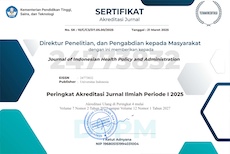Abstract
The Non-Communicable Disease (NCD’s) Prevention and Control Program is one of the essential Community Health Efforts implemented by the Puskesmas. Puskesmas accreditation is a form of program to maintain the quality and form of standardization to Puskesmas services in order to provide quality services. This research uses qualitative method, conducted in April-May 2018, aim to see improvement of performance at puskesmas especially at NCD’s Prevention and Control Program. Result of research, in general Output of program of implementation of NCD’s at Puskesmas accredited better than Puskesmas not yet accredited. Community-based partnership and funding activities have not been implemented, Iva test and CBE screening and DM screening are still around 5%, indicating the community and the lack of effective community empowerment. Input components of human resources, facilities, funds, screening instruction implementation are not adequated. Components of Planning Process (P1), Organizing and Moving (P2) at Accredited Puskesmas better than Puskesmas not yet accredited, P3 has been run even though not optimal in some Puskesmas. Need to improve community empowerment to support NCD’s Prevention and Control Program .. It is necessary to encourage the Puskesmas to improve the implementation of Puskesmas Management and conduct Continuous Improvement of Quality to achieve quality improvement as the main basis of Puskesmas Accreditation.
Bahasa Abstract
Program Pencegahan dan Pengendalian Penyakit Tidak Menular (P2NCD), merupakan salah satu Upaya Kesehatan Masyarakat esensial yang dilaksanakan oleh Puskesmas. Akreditasi Puskesmas adalah bentuk program menjaga mutu dan bentuk standarisasi terhadap pelayanan Puskesmas agar dapat memberikan pelayanan berkualitas. Penelitian ini menggunakan metode kualitatif dengan wawancara mendalam kepada Kepala Dinas Kesehatan Kota Cimahi, Kepala Puskesmas, Tim Pendamping akreditasi, Petugas penanggung jawab NCD’s Puskesmas. Untuk melihat penyelenggaraan Posbindu dilakukan metode kuantitatif menggunakan Uji T terhadap variabel komposit, yang terdiri dari lima dimensi penilaian Kader, sarana, dana dari masyarakat dan kemitraan, pencatatan dan pelaporan serta kegiatan Posbindu pada 48 Posbindu NCD’s. Penelitian dilakukan pada bulan April-Mei 2018, bertujuan untuk melihat pengaruh akreditasi terhadap kinerja puskesmas khususnya pada Penyelenggaraan Program P2NCD. Hasil penelitian, secara umum keluaran penyelenggaraan program P2NCD pada Puskesmas terakreditasi lebih baik dibandingkan Puskesmas belum terakreditasi. Kegiatan kemitraan dan dana yg bersumber dari masyarakat belum berjalan, Skrining Iva test dan CBE dan skrining DM masih sekitar 5%, hal ini menunjukkan kurangnya partisipasi masyarakat dan kurang efektifnya pemberdayaan masyarakat. Komponen Input SDM, dana, sarana dan petunjuk Pelaksanaan. Komponen Proses perencanaan (P1), Pengorganisasian dan penggerakkan (P2)pada Puskesmas terakreditasi lebih baik dibandingkan Puskesmas belum terakreditasi, P3 sudah berjalan walaupun belum optimal di beberapa Puskesmas.Perlu meningkatkan kerjasama lintas sektor dan upaya pemberdayaan masyarakat untuk mendukung Program P2NCD. Perlu mendorong Puskesmas untuk meningkatkan penerapan Manajemen Puskesmas dan melakukan Continiously Quality Improvement untuk mencapai peningkatan kualitas sebagai tujuan utama Akreditasi Puskesmas.
Recommended Citation
Azni, Nurkarti and Darmawan, Ede Surya
(2022)
"ROLE OF ACCREDITATION TO THE PERFORMANCE OF NON COMMUNICABLE DISEASES (NCD’S) CONTROL PROGRAM AND CONTROL IN ACCREDITED AND NON ACCREDITED PRIMARY HEALTH CARE IN CIMAHI DISTRICT,"
Journal of Indonesian Health Policy and Administration: Vol. 7:
No.
1, Article 2.
DOI: 10.7454/ihpa.v7i1.3213
Available at:
https://scholarhub.ui.ac.id/ihpa/vol7/iss1/2
Included in
Health Policy Commons, Health Services Administration Commons, Health Services Research Commons




